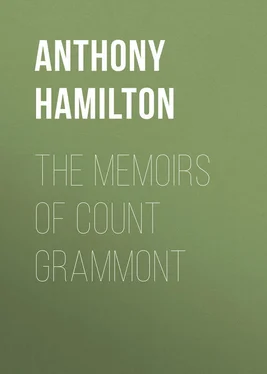Anthony Hamilton - The Memoirs of Count Grammont
Здесь есть возможность читать онлайн «Anthony Hamilton - The Memoirs of Count Grammont» — ознакомительный отрывок электронной книги совершенно бесплатно, а после прочтения отрывка купить полную версию. В некоторых случаях можно слушать аудио, скачать через торрент в формате fb2 и присутствует краткое содержание. Жанр: foreign_antique, foreign_prose, Альтернативная история, на английском языке. Описание произведения, (предисловие) а так же отзывы посетителей доступны на портале библиотеки ЛибКат.
- Название:The Memoirs of Count Grammont
- Автор:
- Жанр:
- Год:неизвестен
- ISBN:нет данных
- Рейтинг книги:4 / 5. Голосов: 1
-
Избранное:Добавить в избранное
- Отзывы:
-
Ваша оценка:
- 80
- 1
- 2
- 3
- 4
- 5
The Memoirs of Count Grammont: краткое содержание, описание и аннотация
Предлагаем к чтению аннотацию, описание, краткое содержание или предисловие (зависит от того, что написал сам автор книги «The Memoirs of Count Grammont»). Если вы не нашли необходимую информацию о книге — напишите в комментариях, мы постараемся отыскать её.
The Memoirs of Count Grammont — читать онлайн ознакомительный отрывок
Ниже представлен текст книги, разбитый по страницам. Система сохранения места последней прочитанной страницы, позволяет с удобством читать онлайн бесплатно книгу «The Memoirs of Count Grammont», без необходимости каждый раз заново искать на чём Вы остановились. Поставьте закладку, и сможете в любой момент перейти на страницу, на которой закончили чтение.
Интервал:
Закладка:
[She was born at the castle of Kilkenny, July, 1640, as appears from Carte’s life of her father, the Duke of Ormond.]
But, although the history altogether was written by Hamilton, it may not perhaps be known to every reader that Grammont himself sold the manuscript for fifteen hundred livres; and when it was brought to Fontenelle, then censor of the press, he refused to license it, from respect to the character of the Count, which, he thought, was represented as that of a gambler, and an unprincipled one too. In fact, Grammont, like many an old gentleman, seems to have recollected the gaieties of his youth with more complaisance than was necessary, and has drawn them in pretty strong colours in that part of the work which is more particularly his own. He laughed at poor Fontenelle’s scruples, and complained to the chancellor, who forced the censor to acquiesce: the license was granted, and the Count put the whole of the money, or the best part of it, in his pocket, though he acknowledged the work to be Hamilton’s. This is exactly correspondent to his general character: when money was his object, he had little, or rather no delicacy.
The History of Grammont may be considered as unique there is nothing like it in any language. For drollery, knowledge of the world, various satire, general utility, united with great vivacity of composition, Gil Blas is unrivalled: but, as a merely agreeable book, the Memoirs of Grammont perhaps deserve that character more than any which was ever written: it is pleasantry throughout, pleasantry of the best sort, unforced, graceful, and engaging. Some French critic has justly observed, that, if any book were to be selected as affording the truest specimen of perfect French gaiety, the Memoirs of Grammont would be selected in preference to all others. This has a Frenchman said of the work of a foreigner: but that foreigner possessed much genius, had lived from his youth, not only in the best society of France, but with the most singular and agreeable man that France could produce. Still, however, though Grammont and Hamilton were of dispositions very different, the latter must have possessed talents peculiarly brilliant, and admirably adapted to coincide with, and display those of his brother-in-law to the utmost advantage. Gibbon extols the “ease and purity of Hamilton’s inimitable style;” and in this he is supported by Voltaire, although he adds the censure, that the Grammont Memoirs are, in point of materials, the most trifling; he might also in truth have said, the most improper. The manners of the court of Charles II. were, to the utmost, profligate and abandoned: yet in what colours have they been drawn by Hamilton? The elegance of his pencil has rendered them more seductive and dangerous, than if it had more faithfully copied the originals. From such a mingled mass of grossness of language, and of conduct, one would have turned away with disgust and abhorrence; but Hamilton was, to use the words of his admirer, Lord Orford, “superior to the indelicacy of the court,” whose vices he has so agreeably depicted; and that superiority has sheltered such vices from more than half the oblivion which would now have for ever concealed them.
The Count de Grammont died in 1707. Some years after the publication of his Memoirs, Hamilton was engaged in a very different work: he translated Pope’s Essay on Criticism into French, and, as it should seem, so much to that great poet’s satisfaction, that he wrote a very polite letter of thanks to him, which is inserted in Pope’s Correspondence. Hamilton’s Essay was, I believe, never printed, though Pope warmly requested to have that permission: the reign of Louis XIV. had now ceased; and, for several years before his death, the character of the old court of that prince had ceased also: profligacy and gaiety had given way to devotion and austerity. Of Hamilton’s friends and literary acquaintance few were left: the Duke of Berwick was employed in the field, or at Versailles: some of the ladies, however, continued at St. Germain; and in their society, particularly that of his niece, the Countess of Stafford (in whose name he carried on a lively correspondence with Lady Mary Wortley Montague), he passed much of his time. He occasionally indulged in poetical compositions, of a style suited to his age and character; and when he was past seventy, he wrote that excellent copy of verses, ‘Sur l’ Usage de la Vie dans la Vieillesse’; which, for grace of style, justness, and purity of sentiment, does honour to his memory.
Hamilton died at St. Germain, in April, 1720, aged about seventy-four. His death was pious and resigned. From his poem, entitled Reflections, he appears, like some other authors, to have turned his mind, in old age, entirely to those objects of sacred regard, which, sooner or later, must engage the attention of every rational mind. To poetry he bids an eternal adieu, in language which breathes no diminution of genius, at the moment that he for ever recedes from the poetical character. But he aspired to a better.
Whatever were Hamilton’s errors, his general character was respectable. He has been represented as grave, and even dull, in society; the very reverse, in short, of what he appears in his Memoirs: but this is probably exaggerated. Unquestionably, he had not the unequalled vivacity of the Count de Grammont in conversation; as Grammont was, on the other hand, inferior, in all respects, to Hamilton when the pen was in his hand; the latter was, however, though reserved in a large society, particularly agreeable in a more select one. Some of his letters remain, in which he alludes to his want of that facility at impromptu which gave such brilliancy to the conversation of some of his brother wits and contemporaries. But, while we admit the truth of this, let it be remembered, at the same time, that when he wrote this, he was by no means young; that he criticised his own defects with severity; that he was poor, and living in a court which itself subsisted on the alms of another. Amidst such circumstances, extemporary gaiety cannot always be found. I can suppose, that the Duchess of Maine, who laid claim to the character of a patroness of wit, and, like many who assert such claims, was very troublesome, very self-sufficient, and very ‘exigeante’, might not always have found that general superiority, or even transient lustre, which she expected in Hamilton’s society: yet, considering the great difference of their age and situation, this circumstance will not greatly impeach his talents for conversation. But the work of real genius must for ever remain; and of Hamilton’s genius, the Grammont Memoirs will always continue a beauteous and graceful monument. To that monument may also be added, the candour, integrity, and unassuming virtues of the amiable author.
CHAPTER FIRST. INTRODUCTION
As those who read only for amusement are, in my opinion, more worthy of attention than those who open a book merely to find fault, to the former I address myself, and for their entertainment commit the following pages to press, without being in the least concerned about the severe criticisms of the latter. I further declare, that the order of time and disposition of the facts, which give more trouble to the writer than pleasure to the reader, shall not much embarrass me in these Memoirs. It being my design to convey a just idea of my hero, those circumstances which most tend to illustrate and distinguish his character shall find a place in these fragments just as they present themselves to my imagination, without paying any particular attention to their arrangement. For, after all, what does it signify where the portrait is begun, provided the assemblage of the parts forms a whole which perfectly expresses the original? The celebrated Plutarch, who treats his heroes as he does his readers, commences the life of the one just as he thinks fit, and diverts the attention of the other with digressions into antiquity, or agreeable passages of literature, which frequently have no reference to the subject; for instance, he tells us that Demetrius Poliorcetes was far from being so tall as his father, Antigonus; and afterwards, that his reputed father, Antigonus, was only his uncle; but this is not until he has begun his life with a short account of his death, his various exploits, his good and bad qualities; and at last, out of compassion to his failings, brings forward a comparison between him and the unfortunate Mark Antony.
Читать дальшеИнтервал:
Закладка:
Похожие книги на «The Memoirs of Count Grammont»
Представляем Вашему вниманию похожие книги на «The Memoirs of Count Grammont» списком для выбора. Мы отобрали схожую по названию и смыслу литературу в надежде предоставить читателям больше вариантов отыскать новые, интересные, ещё непрочитанные произведения.
Обсуждение, отзывы о книге «The Memoirs of Count Grammont» и просто собственные мнения читателей. Оставьте ваши комментарии, напишите, что Вы думаете о произведении, его смысле или главных героях. Укажите что конкретно понравилось, а что нет, и почему Вы так считаете.












